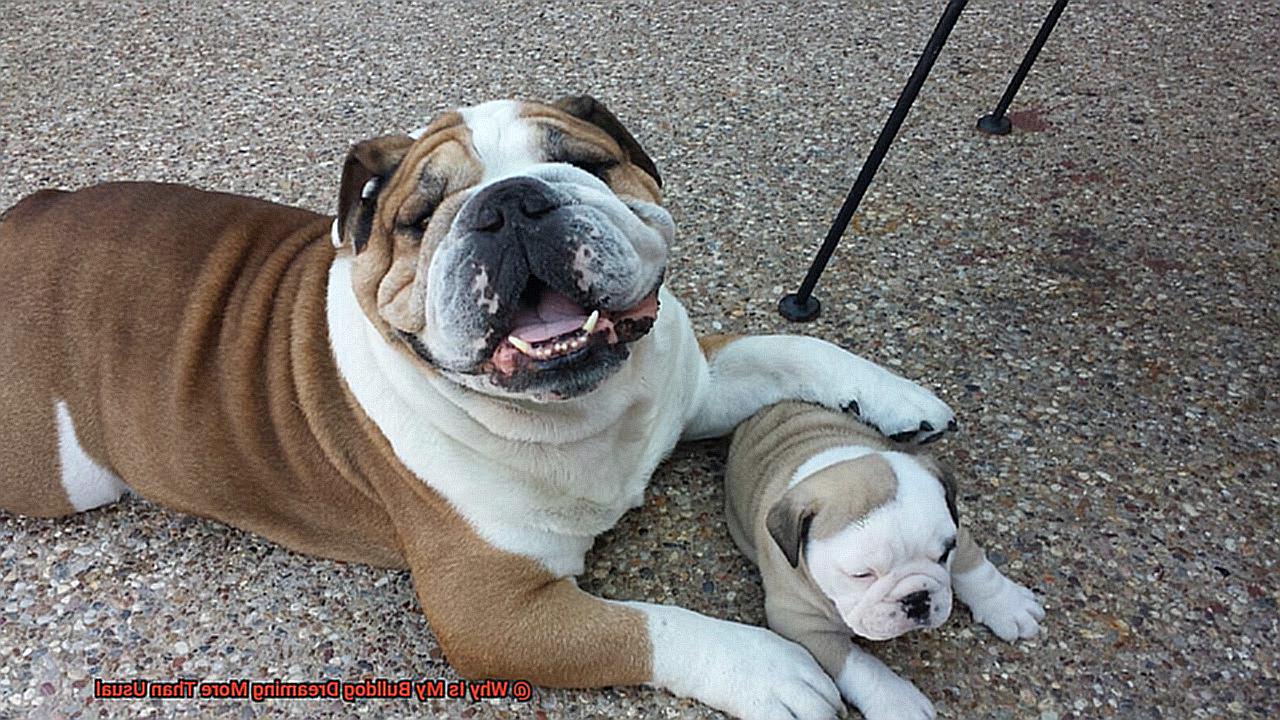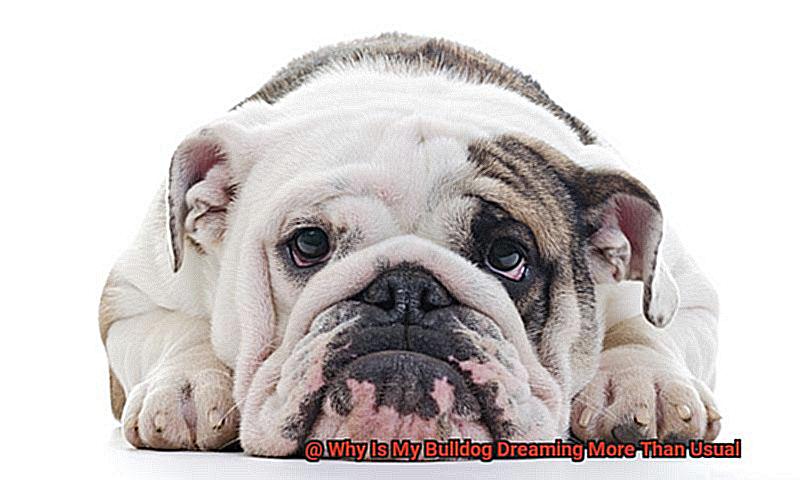Why Is My Bulldog Dreaming More Than Usual?
Are you concerned about why your bulldog is dreaming more than usual? It can be worrying to watch your pup toss and turn in their sleep.
But don’t worry – there are a few possible reasons for this behavior.
Bulldogs need special care, including regular and adequate sleep.
If they’re not getting enough rest, they may start to dream more than normal as their bodies try to catch up.
Dreams in dogs can reveal how content they feel in their environment.
If your bulldog is having happy dreams, it could mean that they feel safe and secure in their home.
On the other hand, if they have nightmares or frightening dreams, it could indicate that something is causing them anxiety or fear.
It’s important to remember that all dogs dream – some breeds may just dream more than others. All dogs experience REM (Rapid Eye Movement) sleep, which is a period of deep relaxation and vivid dreams.
In this blog post, we’ll discuss why your bulldog is dreaming more than usual and what steps you can take to ensure your pup gets the restful sleep they need each night.
Keep reading to learn more about Why Is My Bulldog Dreaming More Than Usual.

What is Dreaming?
Contents
As we drift off to sleep, a movie begins to play in our minds.
Anything can happen on this mysterious journey.
Dreams can be uplifting, frightening, or even mundane.
They can be filled with vivid colors and emotions, or just a collection of random images.
But why do animals dream?
It turns out that dreaming serves a critical purpose for animals, just as it does for humans.
Dreaming helps animals process memories and experiences from the day before and teaches them how to survive in the wild.
For instance, cats may dream of chasing mice or birds while birds may dream of flying away from predators.
Dreaming is an integral part of the animal world and it helps keep animals safe and healthy in their natural habitats.
Causes of Increased Dreaming
There are a few potential causes for increased dreaming in dogs.
Age is one factor; as our canine friends get older, changes in their brain chemistry can lead to more frequent and vivid dreams.
Stress can also be a culprit; when our furry pals are feeling anxious, certain hormones are released that can disrupt their sleep cycles.
Illness is another cause; conditions such as epilepsy and narcolepsy can cause a dog to dream more than usual.

Additionally, medications used to treat certain disorders may also contribute to increased dreaming.
Dreams can give us insight into a dog’s inner world.
Dogs have hopes and fears, joys and sorrows – just like us – when they drift off into dreamland.
Should You Wake a Dog Up From a Dream?
Dreams can be a mysterious and exciting part of life, and our furry friends are no exception.
But should you rouse them from their REM cycle? Let’s examine the pros and cons of waking up a dog from a dream.
On one paw, there are some benefits to interrupting your pooch’s sleep.
Doing so can prevent them from having a bad dream, keep them alert and focused on something else, and help them stay awake.
On the other hand, it can cause distress to the pup, interrupting their REM sleep cycle, and causing confusion and disorientation.
So how do you know when it’s okay to wake up your pup? It really depends on the situation.
If they’re having a nightmare or barking in their sleep, it might be helpful to get them up.
However, if they’re just twitching or making little noises in their sleep, it’s probably best to leave them alone.
If you do decide to rouse your dog from dreaming, make sure you do so in an effective and safe manner.
Gently petting or whispering softly against their ear is usually enough to wake them without causing too much confusion.
As an extra reward for being so brave, you may even want to give your dog a treat afterward.
How Do You Tell if Dog Is Dreaming or Having a Seizure?
It can be difficult to determine if your pup is dreaming or having a seizure.
While both are neurological activities, there are some key differences that can help you recognize which one is occurring.
Signs of a seizure include loss of consciousness, rigid limbs and drooling or paddling.
On the other hand, when a dog is dreaming, they may twitch their paws, whimper, or even bark during sleep.
Additionally, while a dog’s eyes may be open or closed during a dream, they will be closed during a seizure.
Seizures usually last longer than dreams and the pup will remain unconscious until it ends.
If you suspect your dog is having seizures, it’s best to consult with a veterinarian right away.
What Do Dogs Dream About When They Whimper?
Dogs may be dreaming of something familiar from their daily life, such as a walk in the park or playing with a toy.
They may also be dreaming of something they fear, like loud noises or being chased.
It’s even possible that dogs are dreaming of something they desire, such as food or affection.
Dogs can sometimes recall events from their past – both positive and negative experiences.
When dogs whimper during their dreams, it is often because they are trying to express what is happening in the dream.
Age Related Dreams
As our canine companions age, they may experience an unexpected phenomenon: age-related dreams.
As dogs get older, changes in their sleeping patterns can lead to more frequent dreaming.
Older dogs may sleep more often and have vivid dreams – almost like they’re living out an epic adventure in their slumber.
It’s important to note that age-related dreaming is not necessarily a bad thing and should not be a cause for concern.
If your dog is having frequent dreams but is otherwise healthy, it is likely nothing to worry about and can just be seen as a normal part of aging.
However, if you are concerned about your dog’s age related dreaming, it is vital to take them for regular check-ups with your vet in order to rule out any underlying health problems that could be causing the increased dreaming.
Additionally, there are certain supplements available that can help promote restful sleep in older dogs and reduce the frequency of their dreams.
Natural Solutions to Reduce Dreams
Fortunately, there are some natural solutions that can help reduce the amount of dreaming in dogs.
Exercise is essential for reducing dreams in dogs.
Taking your pup out for a walk or playing fetch with them will help reduce stress and anxiety, both of which can lead to fewer dreams.

Make sure your pup is getting enough daily exercise and playtime to ensure they’re healthy and happy.
A balanced diet is also key for reducing the amount of dreaming in dogs.
A diet high in healthy fats, proteins, and carbohydrates can help keep stress levels low and result in fewer dreams.
Mental stimulation is also important for keeping your pup’s mind active and reducing the amount of dreaming they do.
Puzzles and interactive toys are great ways to keep their minds engaged while also providing them with some much-needed distraction from any nightmares they may be having.
Finally, providing comfort items such as a favorite toy or blanket for your pup will make them feel more secure and relaxed – creating a peaceful dreamscape for them at night.
Medical Solutions to Reduce Dreams
Is your bulldog having nightmares? Don’t worry – medical solutions exist to reduce the frequency of these distressing dreams.
Veterinarians may prescribe anti-anxiety medications, sedatives, and other drugs to help relax your pup and reduce their stress levels.
Natural supplements such as melatonin, omega-3 fatty acids, and other supplements can also have a calming effect.
Behavioral modification is another key factor in lowering dream frequency in dogs.
This includes providing mental stimulation throughout the day, regular exercise, and eliminating potential triggers for anxiety or stress in the home environment.
You can create a dream-free oasis for your pup.
Dietary changes are also important for reducing nightmares in bulldogs.

Make sure your dog is getting all of the necessary vitamins and minerals from its diet and avoiding foods that might trigger anxiety or stress.
A balanced diet is like a dream-reducing superpower.
Conclusion
Dreams can be confusing and even frightening for pet owners.
Knowing why your bulldog is dreaming more than usual, however, can help ease some of the worry.
There are only a few potential causes for increased dreaming in dogs, such as age, exhaustion, illness or medications.
It’s also important to distinguish between dreams and seizures since they have different signs and symptoms.
Fortunately, there are natural and medical products that can help reduce the amount of dreams in dogs.
Exercise, mental stimulation and a balanced diet are essential for keeping dream frequency low while anti-anxiety drugs and supplements may also provide relief.
So next time you see your pup snoozing away peacefully, remember that they’re likely having an exciting adventure inside.




